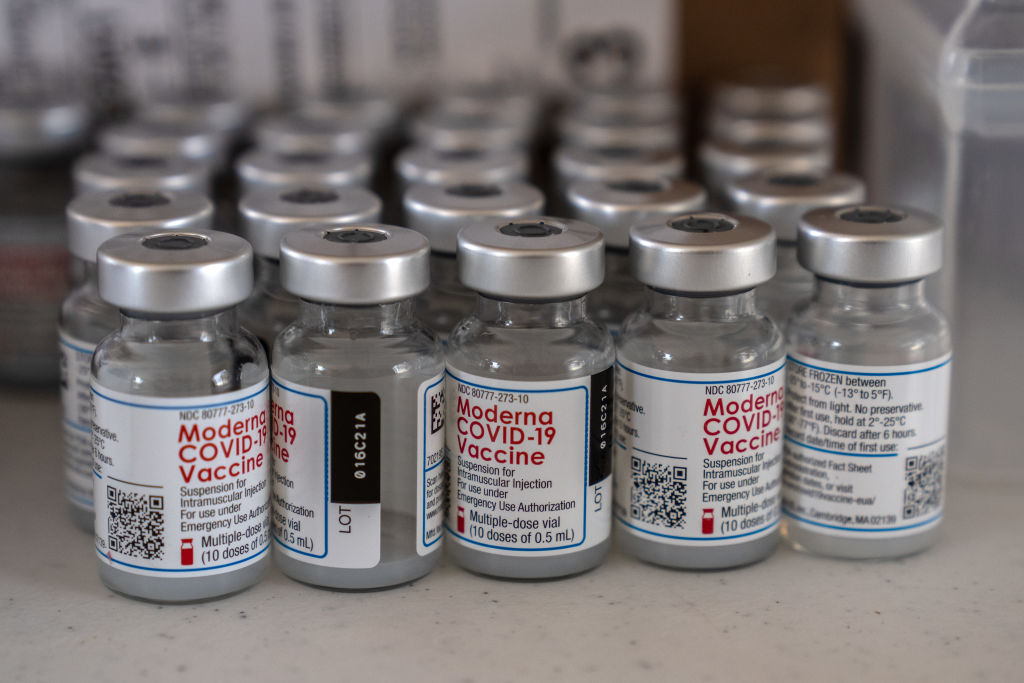
As safety concerns over COVID-19 vaccines from AstraZeneca and Johnson&Johnson–Janssen have led to disruptions in the inoculation efforts of numerous countries relying on those shots, companies like Moderna are attempting to fill the resulting gaps.
The Massachusetts-based biotech company announced on April 29 that it is investing billions to boost manufacturing facilities in Switzerland, Spain and the U.S., building enough capacity to produce up to 3 billion doses of its mRNA-based vaccine through 2022. The company’s vaccine technology differs from that of AstraZeneca and J&J, which both use an adenovirus to deliver COVID-19 virus genes to the immune system—and which both have been have been associated with serious, life-threatening—albeit very rare—blood clots.
Stephane Bancel, CEO of Moderna, says that some of the wealthier, developed countries are eager to up their orders of the mRNA vaccines (which include both the Moderna shot and one produced by Pfizer/BioNTech). “In the last month or so, in the discussions we have had with heads of state, prime ministers, presidents of countries and health ministers, when governments look at efficacy, safety, manufacturing scalability, and the speed to the next generation of vaccines, what we are hearing loud and clear is that mRNA is the best for the problem at hand,” says Bancel. “And governments around the world want more and more mRNA product.”
To meet that need, and the needs of facilities in less-resourced countries that don’t have the freezer capabilities required to store the company’s vaccine currently, Bancel says that his scientists are studying a new version of the Moderna vaccine that won’t need to be frozen, and instead would simply need to be kept under refrigerated conditions for up to three months. Right now, it can only be stored at those temperatures for one month after the doses are thawed from their frozen storage temperature of about -20°C (14°F)—which requires special equipment that is not widely available. If the studies show the new vaccine could be stable and efficacious at refrigerated temperatures, that could increase the number of places that could vaccinate with Moderna’s shot.
“We played with a couple of key technological decisions and it is indeed a very different product,” says Bancel about the refrigerated version, which the company has just started testing in people. That means efficacy data won’t be available until the end of summer at the earliest; the company is working with the FDA to figure out what the authorization process would look like for that vaccine.
Meanwhile, the company is also studying three new versions of its COVID-19 vaccine to address viral mutations. One is specifically designed to protect against a more infectious variant of the virus, B.1.351, first identified in South Africa. The current Moderna vaccine has been shown in studies to bestow sufficient protection against this variant, but that protection is slightly lower than that provided against the original viral strain, and Moderna researchers are testing if the new shot activates a stronger immune response against the B.1.351 variant. Studies in animals are promising and human studies have just begun, so by early fall, says Bancel, “we expect the data [for the new vaccine] in humans to be as strong as what we saw last year with the current vaccine.”
The Moderna team is also testing whether a third shot of its currently authorized vaccine—at a lower dose than the first and second shots—could be effective as a booster, to increase protection against variant strains. And finally, the company is also testing a vaccine that combines the original vaccine with the new one against the South African variant.
Looking ahead, some public health experts believe controlling COVID-19 may require regular vaccinations, similar to flu shots, to maintain immune protection. Anticipating that, Moderna scientists are also working on a combined flu and COVID-19 shot that would protect people against both respiratory diseases.
More Must-Reads from TIME
- Donald Trump Is TIME's 2024 Person of the Year
- Why We Chose Trump as Person of the Year
- Is Intermittent Fasting Good or Bad for You?
- The 100 Must-Read Books of 2024
- The 20 Best Christmas TV Episodes
- Column: If Optimism Feels Ridiculous Now, Try Hope
- The Future of Climate Action Is Trade Policy
- Merle Bombardieri Is Helping People Make the Baby Decision
Contact us at letters@time.com